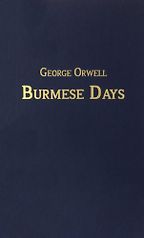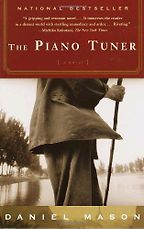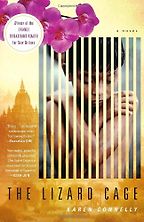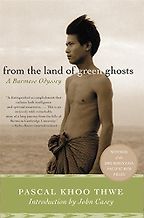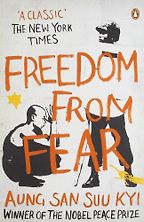Your first book?
For fiction about Burma, I suppose you should start with the classic of all time, which has to be Orwell’s Burmese Days. It’s based on Orwell’s experiences in Burma from 1922 to 1927. The story is about John Flory, a timber merchant in Burma, who’s a bit disillusioned and nothing much is happening to him. Everything is based around the English Club, with all the tiny things that put you wrong, and it’s such a mean, bitchy little place. It’s terribly snooty, and they don’t want Flory’s Indian friend Dr Veeraswami to become a member. Just like the Scots and English the Burmese have these animosities that go back for ever, and they look down on Indians, and call them ‘dog Indians’.
Flory has a Burmese mistress, but then this girl Elizabeth arrives, who’s come out to Burma to stay with her uncle. She’s pretty dreadful but better than no one. Flory is very pro-Burma and the Burmese, but Elizabeth is full of English prejudices and racism and can’t stand it.
The book’s very funny in that way that Orwell is funny. Flory shows off – they go shooting and he shoots a leopard and decides he’ll have it skinned and give it to Elizabeth as a rug, but then he has it cured badly and it absolutely stinks. Anyway, a scheming local official pays Flory’s mistress to come back and cause a scandal, and Flory is wretched because Elizabeth is horrified. It’s terribly sad, terribly good and brilliantly written, and says an awful lot about British prejudices and British colonialists. Burma’s a very strange place generally, because it wasn’t like India, with an infrastructure. If you went there, there wasn’t so much of that high Calcutta social life and the racecourse and so on. It got like that later on, and Rangoon airport became the busiest airport in Southeast Asia in about the 20s. Academics went out there, it was a great place, and Rangoon got to be on a par with Calcutta, but certainly not upcountry like in this book, where it was like the Wild West – a frontier place. You know where you are with Burmese Days, though, because it’s Orwell and he’s never written a bad sentence in his life. It’s just wonderful: funny, ironic, a horribly sad portrait of colonial life.
Your next book?
The Piano Tuner, by Daniel Mason. It’s a first novel, and it’s extraordinarily original and interesting. It’s set in the southern Shan States in 1886 and it’s about Edgar Drake who specialises in tuning rare pianos. Drake gets a call from someone at the War Office saying would he come to see him about going out to Burma to tune an Erard, which is the rarest of all pianos: there were only maybe 90, and Napoleon was sent one and Beethoven had one. But in 1886, to get to Burma? You’re talking about at least six weeks’ travel.
So Drake goes out and on the way he has strange conversations with people on the boat about myths, and they go through Aden and across to Bombay, and he’s dazzled by it. As you can imagine he’s never seen so many people, or so many beggars. They get the train to Calcutta and cross the Andaman sea to Rangoon, and then a train up to Mandalay where he’s met by this woman who says she’s going to guide him, and she speaks English and always wears a flower in her hair. Burmese women wear fresh flowers in their hair – apparently my grandmother had a fresh flower every single day. And she’s going to take him on the final journey by elephant up into the jungles, and she’s ravishing and reminds me of Aung San Suu Kyi. She is very quiet and obviously also the lover of Dr Anthony Carroll, who owns the piano.
A little bit Heart of Darkness by now?
Yes, except much more civilised! So to cut a long story short, we’re now on to the Third Anglo-Burmese war, and there’s this chap called Surgeon-Major Dr Anthony Carroll, who’s posted to the Shan States in Upper Burma – in the jungles. And he has a strange empathy with the Burmese and has won over some local princes – warlords – by quoting them Shelley and playing the piano: it’s like winning hearts and minds. And he asked for an Erard, and the War Office sent one out – which is like someone in Helmand Province asking for a Stradivarius – and it now needs to be tuned.
So Edgar Drake comes, and there are wonderful descriptions of him listening to the rain, because he knows about music. Orwell gives beautiful descriptions of Burma with butterflies as big as brooches, and the quality of the light and sunsets and so on, but Mason can talk about the different sounds of monsoon rain, and how rain falling on willows sounds different to rain falling on orchids or touching the ground, and it’s just wonderful. He’s really got the whole thing about the myths of Burma. Myths and magic and spiritualism and reincarnation are so important in Burma – just as in India – and every house has a ‘nat’: the spirits that look after your household, and they have different names. There’s ‘the lady with the green umbrella’, or ‘the prince in the yellow trousers’. There’s even a nat called ‘Major Thompson’, who was named after some important British person. And you leave flowers and little bits of food and do lots of washing and wishing and praying.
Did the author spend time in Burma?
Daniel Mason? I think he was a medical student there in the 1990s, and he did a lot of historical research. There was not a dull moment for me in this book: I loved it, and it has such a lot about the atmosphere of Burma. I think he gets this whole thing about the myths, and people setting so much store by little things. My grandmother had seven sons, and the monks who came down to her village in the morning with their begging bowls would be careful not to step on her shadow, because you knew that you mustn’t step on the shadow of a woman with seven sons. And he picks things like that up and doesn’t overdo it. Less is more. Unlike Karen Connolly.
She wrote The Lizard Cage?
Yes, I think she spent time on the Thai-Burmese border where all the refugees are based. It’s actually a jolly harrowing book, a bit of a whodunnit. The Lizard Cage is a prison about 100 miles from Rangoon and the Burmese equivalent of a gulag, with political prisoners, gangster prisoners, and the most reviled are the political prisoners in solitary. The book is about this man known as the songbird, who was supposed to be a doctor and got muddled up in the Aung San Suu Kyi pre-NLD elections in 1988, and was put in solitary in this appalling cell. He meditates in his cell and doesn’t talk to anybody but the lizards and the ants to stop himself going mad. Every week he goes to have a shower and the shower room is dark and full of rats that you have to get rid of, and it’s really ghastly, but it lifts the veil on conditions in Burmese prisons. There’s this appallingly brutal jailer who beats him, and won’t let him wash and he gets these suppurating sores and he knows if he doesn’t wash them he’ll get amoebic dysentery.
This is about a real person?
No, but it’s based on millions of real characters in Burma now. In fact it could be that one, the Burmese comedian, who was sent to prison for telling jokes about five years ago.
Tell me about From the Land of Green Ghosts
This is very interesting, very poetically written, and it’s a true story. Pascal Koo Thwe is from the Padang tribes, somewhere north of Mandalay – not quite the Shan States, but certainly up there. The Padang are famous because they have the giraffe-necked women. He went to Mandalay University and got caught up in the 1988 student revolution and the protests, and had to race off, and his girlfriend was caught and raped and killed by the army, so he had to live in hiding in the forest.
Before that, though, when he was a student he worked as a waiter, and in this restaurant he struck up a relationship with John Casey, who was an English professor who used to visit Burma. They started to write to each other and miraculously the letters got through when Pascal Koo Thwe was living in the forest. Casey suggested he come and study, and got him a place at Caius College, Cambridge to read English literature. Pascal Koo Thwe became kind of Casey’s mission: Casey wanted to save him because he was intelligent, and he offered him the place at Cambridge and paid for him and everything. But although they let Pascal leave the country, he wasn’t allowed to come back.
Like Aung San Suu Kyi?
Exactly. He writes beautifully about growing up in Burma and these lovely descriptions of his childhood among the long-necked women, and then these awful things that happened to him and how he went to the forests with the Karen tribes and lived on the front line as a partisan. And then he writes about his life in England and it’s fascinating. I’m not sure Pascal Koo Thwe is very happy or fulfilled because I feel that if you’re Burmese and you want to do something you should be there somehow.
Last book?
From the horse’s mouth herself – Aung San Suu Kyi’s Freedom from Fear. It’s very serious, but she is a very serious woman. Part one is about the intellectual cultural and political life in Burma, and she goes through the history of Burma fairly lengthily and prosaically. The book’s quite heavy going, in that the history goes on and on. And she writes about things like ‘the ten duties of a king’ which are: liberality, morality, self-sacrifice, integrity, kindness, austerity, non-anger, non-violence, non-opposition to the will of the people and so on – what’s new about that? It’s a bit like a maharishi having his discourses in an ashram. But she has remained true to that description of a king.
Is her non-violence rooted in her Buddhism?
Absolutely no question! And her whole way of life is so non-confrontational. She says about non-violence: ‘Emerald cool we may be, as water in cupped hands. But oh that we may be as splinters of glass in cupped hands.’ You wouldn’t expect this book to be a barrel of laughs, but the key thing is it’s written by her. She used to be a main tourist attraction in Burma before she was put under house arrest. She would come out of her house in University Avenue and would give one of her discourses. It was like in London at 11 o’clock you go to the changing of the guard, but in Rangoon at 3 o’clock, you went to University Avenue and you could hear Aung San Suu Kyi.
I had tea with her in 1985 and she was wonderful: she was adamant that people should not come to Burma, that it was not helping, and there should be sanctions. It’s exactly the opposite of the argument that you have to go to Burma and talk to the people and see for yourself. I mean, how much can you actually talk to the people under a regime like that? Burma’s been so horribly ruined you’d hardly want to go. They’re doing appalling things to Pagan, for example, where there are 2,000 pagodas and they’re doing them up like Disneyland with all the wrong paints, and they’ve moved the villagers who lived there, and it’s horrible.
But Aung San Suu Kyi is wonderful, and my mother, who was Burmese, always said she should leave Burma and travel around the world and rake up support for her cause. But the fact is that she’s there, she’s a kind of role model, and she’s all they’ve got really.
Five Books aims to keep its book recommendations and interviews up to date. If you are the interviewee and would like to update your choice of books (or even just what you say about them) please email us at [email protected]
Five Books interviews are expensive to produce. If you've enjoyed this interview, please support us by donating a small amount.
